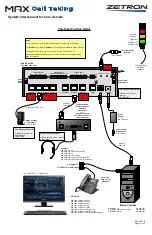
FRICK
®
QUANTUM
™
HD VILTER
®
RETROFIT
INSTALLATION INSTRUCTIONS
090.040-I02 (AUG 2014)
page 9
GROUNDING
Grounding is the most important factor for successful opera-
tion and is typically the most overlooked. The NEC states that
control equipment may be grounded by using the rigid conduit
as a conductor. This worked for the earlier relay systems, but
it is in no way acceptable for electronic control equipment.
Conduit is made of steel and is a poor conductor relative
to an insulated stranded copper wire. Electronic equipment
reacts to very small currents and must have a proper ground
in order to operate properly; therefore, stranded copper
grounds are required for proper operation.
For proper operation, the control power ground circuit must
be a single continuous circuit of the proper sized insulated
stranded conductor, from the electronic control panel to the
plant supply transformer (See Figure below). Driving a ground
stake at the electronic control may also cause additional
problems since other equipment in the plant on the same
circuits may ground themselves to the ground stake causing
large ground flow at the electronic control panel. Also, run-
ning multiple ground conductors into the electronic control
panel from various locations can create multiple potentials
resulting in ground loop currents. A single ground wire (10
AWG or 8 AWG) from the electronic control panel, that is
bonded to the control power neutral at the secondary side
of the control power transformer in the starter and then to
the 3-phase ground point, will yield the best results.
Figure 6. Control power Ground Circuit
NOTICE
Structural grounding can also result in multiple ground
potentials and is also a relatively poor conductor.
Therefore, this is not an acceptable method for proper
operation of electronic equipment.
There must be a ground for the three-phase power wiring.
This must be sized in accordance to the NEC and any local
codes relative to the highest rated circuit overload protec-
tion provided in the circuit. The manufacturer may require a
larger ground conductor than what is required by the NEC for
proper steering of EMI from sensitive circuits. This conduc-
tor must also be insulated to avoid inadvertent contact at
multiple points to ground, which could create Ground Loops.
In many installations that are having electronic control prob-
lems, this essential wire is usually missing, is not insulated,
or improperly sized.
NEC size ratings are for safety purposes and not necessarily
for adequate relaying of noise (EMI) to earth ground to avoid
possible interference with sensitive equipment. Therefore
sizing this conductor 1 – 2 sizes larger than required by code
will provide better transfer of this noise.
Johnson Controls-Frick
®
requires that the ground conductor
meet the following:
• Stranded Copper
• Insulated
• One size larger than NEC requirements for conventional
starters
• Two sizes larger than NEC requirements for VFD starters
• Conduit must be grounded at each end
• This circuit must be complete from the motor to the
starter continuing in a seamless manner back to the plant
supply transformer (power source).
For Direct Coupled, Package Mounted Starters, the ground
between the motor and the starter may need to be made
externally (See Figure below). The connection on the starter
end must be on the starter side of the vibration isolators.
Be certain the connection is metal to metal. Paint may
need to be removed to ensure a proper conductive circuit.
The use of counter-sunk star washers at the point of con-
nection at each end will maximize metal to metal contact.
Figure 7. Motor And Starter Grounding
VFD AppLICATIONS
The primary ground conductor that accompanies the three-
phase supply must be stranded copper, insulated and two
sizes larger than the minimum required by the NEC or any
other applicable codes. This is necessary due to the increased
generation of EMI which is a characteristic of a VFD output
to the motor when compared to a conventional starter.
For VFD applications, isolation of the control power, analog
devices, and communications ground from the 3-phase
ground within the starter and the electronic control panel may
be necessary. This is due to the higher noise (RFI/EMI) levels
generated between the VFD output and the motor, relative
to a conventional starter. If these grounds are left coupled
by a common back-plate in the starter/drive, this noise can
be direct coupled to the control power, analog device, and
communications grounding and may cause unexplained
behavior and possible damage to components.






























